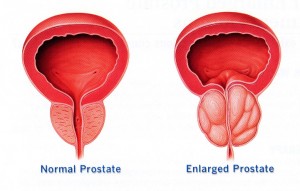Benign Prostatic Hyperplasia (BPH) is a benign non-cancerous enlargement of the prostate gland and is the most common prostate problem in men aged over 50. It is not cancer, and it does not raise your risk for prostate cancer. It may also be referred to as benign prostatic hypertrophy.
The prostate surrounds the urethra (the tube that urine passes through from the bladder to the penis) and as the prostate gland enlarges, it narrows the urethra making urination more difficult. This results in the following symptoms:
- Poor flow or a weak stream
- Urinary frequency (the need to urinate often)
- Urinary urgency (the need to urinate in a hurry)
- Difficulty in starting to urinate (hesitancy)
- Waking up at night to urinate (nocturia)
- Dribbling at the end of urination
- Incomplete emptying of the bladder

The actual cause of prostate enlargement is unknown. Factors linked to aging and the testicles themselves may play a role in the growth of the gland. Men who have had their testicles removed at a young age (for example, as a result of testicular cancer) do not develop BPH.
Some facts about prostate enlargement:
- The likelihood of developing an enlarged prostate increases with age.
- BPH is so common that it has been said all men will have an enlarged prostate if they live long enough.
- A small amount of prostate enlargement is present in many men over age 40 and more than 90% of men over age 80.
- No risk factors have been identified other than having normally functioning testicles.



